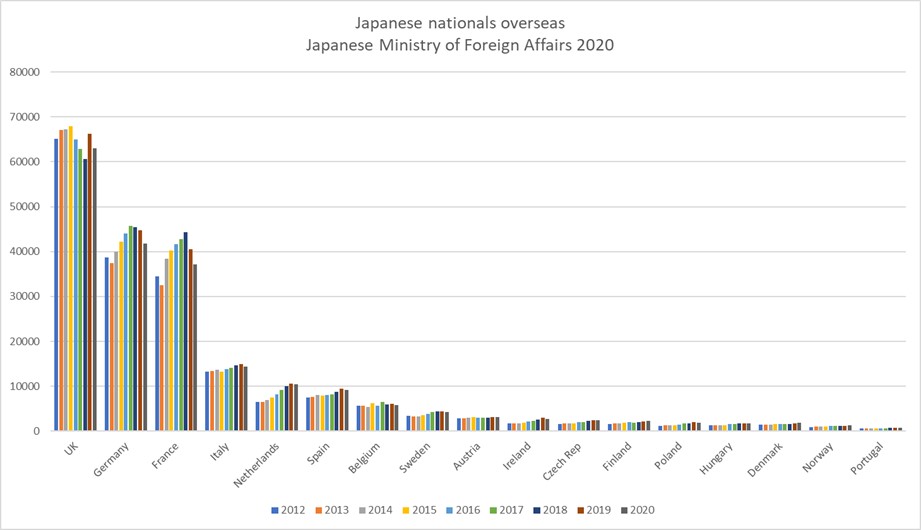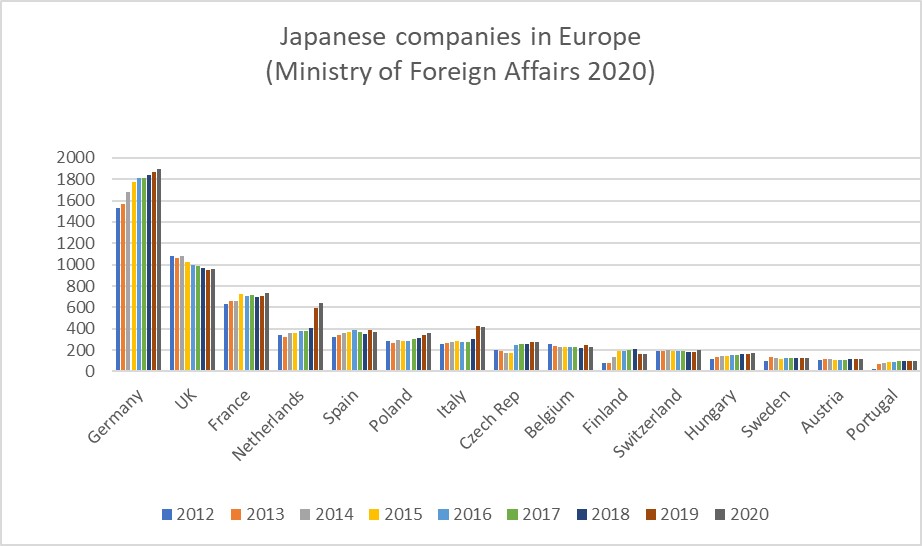There’s no doubt the Netherlands has done well from Brexit in terms of Japanese investment into Europe. Its strong services sector has made it a useful alternative regional coordination hub to London and there is a longstanding thriving Japanese community in the Amsterdam area. Both the numbers of Japanese nationals living in the Netherlands and the numbers of Japanese companies in the Netherlands have shot up the past few years, in contrast to a clear decline in Japanese companies in the UK, and a rather more bumpy but downward trend in Japanese nationals in the UK. There have also been some significant acquisitions of Dutch companies by Japanese companies since 2016.

The number of Japanese companies in Germany, the largest host in Europe, has also grown steadily over the past few years, making the sudden rise in Japanese companies in the Netherlands and Italy in the past two years look somewhat anomalous. The Ministry of Foreign Affairs (MoFA) does not explain what caused this sudden leap but they are sticking to their guns with the recent release of the data for 2020.

Cross referencing the MoFA data with the Toyo Keizai directory and our own desk research, we think the sudden jump in the number of Japanese companies in the Netherlands and Italy are probably to do with the recent acquisitions – perhaps Outsourcing acquiring Netherlands headquartered Otto Work Force in 2018, supplemented by Mitsubishi Corporation acquiring Dutch energy company ENECO in 2020. In the case of Italy, it could be due to Hitachi acquiring various companies from Ansaldo STS.
Our database contains 352 Japanese companies in Italy, sitting neatly betwen the 415 registered by MoFA and the 269 recorded in the Toyo Keizai directory. But our estimate of 503 Japanese companies in the Netherlands is lower than both the 525 in the Toyo Keizai and the 639 in MoFA’s records. We only enter companies which we can verify have employees into our database, which is why we appear to have under-recorded the number. Many of the companies identified by Toyo Keizai and presumably MoFA are brass plate, holding company type entities. As was seen in the acquisition of Otto Work Force, even one company in the Netherlands turns out to have multiple legal entities attached to it – at least 9 different subsidiaries are associated with Otto Work Force in the Netherlands. According to Dun & Bradstreet, Outsourcing’s holding company in the Netherlands now has over 50 companies associated with it.
Some of the Netherlands based companies we have not recorded may well have employees, but it seems Dutch companies are not obliged to disclose as much information as similar companies in the UK, for example – where employee numbers, even for the smallest company, are disclosed and freely available on Companies House.
Bearing the lack of data in mind, our Top 30 Japanese companies in the Netherlands needs to be treated with caution, but we can certainly see that Outsourcing and Mitsubishi Corporation‘s recent acquisitions have pushed them into the Top 30. Recruit, another major Japanese recruitment company, also entered the Top 30 with its acquisition of USG People in 2015 and Orix, the Japanese financial services company, acquired Dutch asset manager Robeco in 2013.
As these acquisitions show, Japanese companies have mainly been investing in the Netherlands’ services sector. There are some companies with manufacturing operations such as Omron, making control equipment, factory automation systems, electronic components, automotive electronics, ticket vending machines and medical equipment. Toyota Industries entered the Top 30 with its acquisition of materials handling systems manufacturer Vanderlande in 2017 and Canon manufactures printing production systems, as one of its legacies of acquring Oce more than ten years ago. Other major manufacturers are Astellas (pharmaceuticals) and Teijin (fiber). The notable absences from the Top 30 in terms of manufacturing are from the automotive sector – no Japanese car companies have plants in the Netherlands, and as a consequence, none of their suppliers do either.
The 30,000 employees who work for the Top 30 largest Japanese employers in the Netherlands represent around 70% of the total number of Netherlands based employees working in Japanese companies. This puts the Netherlands in equal 7th place with the Czech Republic in terms of largest numbers of employees in Europe, after Germany, UK, France, Poland, Italy and Spain. As the Netherlands is host to the fifth largest number of Japanese nationals and fourth largest number of Japanese companies, this is a further indication that the Netherlands has relatively few manufacturers with large numbers of employees and rather more in the way of holding companies with no employees, and a relatively higher density of Japanese expatriates compared to some other European countries.
See our 2022 top 30 Japanese employers for the Netherlands for updates.
For more content like this, subscribe to the free Rudlin Consulting Newsletter. 最新の在欧日系企業の状況については無料の月刊Rudlin Consulting ニューズレターにご登録ください。
